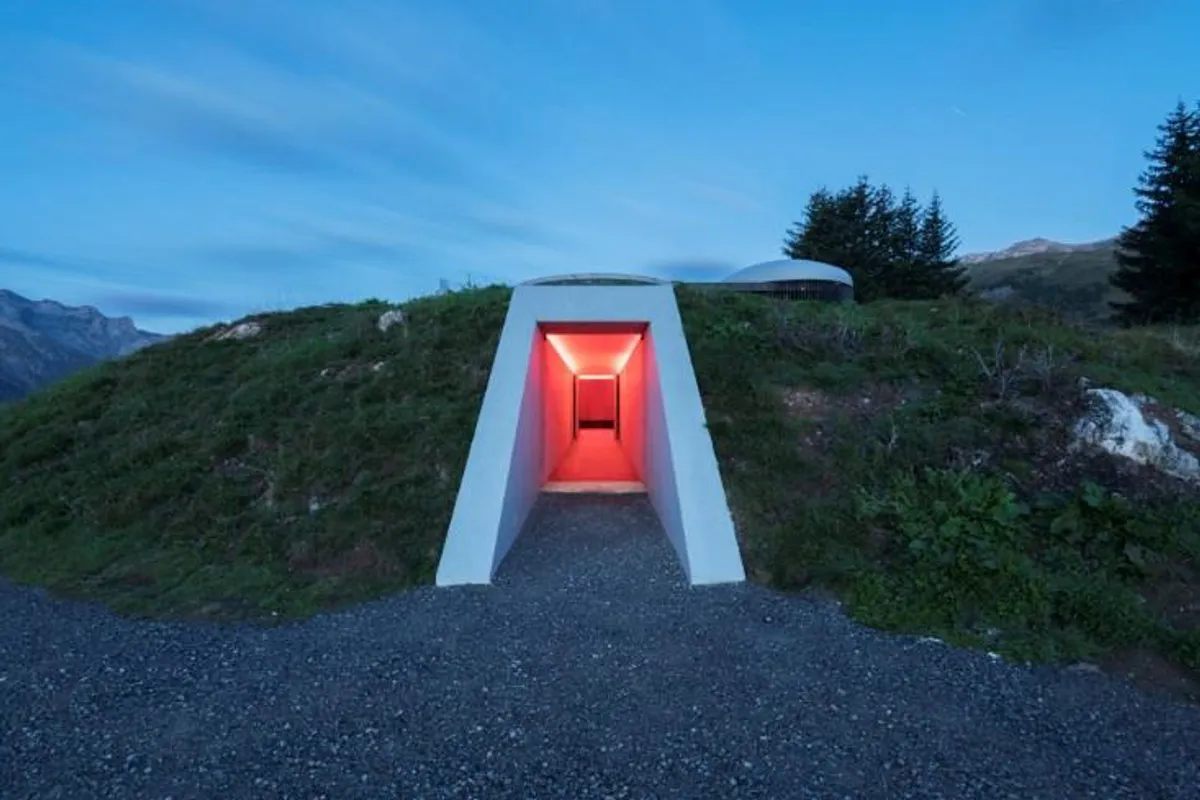
Light as a metaphor for sensory perception: James Turrell realises Skyspace Lech with a special lighting solution from Zumtobel
The largely underground Skyspace Lech created by light artist James Turrell blends discreetly into the high-alpine landscape of the Arlberg mountains in western Austria. Those passing by see little more than an elliptical dome and a similarly rounded construction made from natural stone. Yet below these unassuming features lies an oval light room with an opening in the ceiling that offers a truly unique view of the sky, helping to bring the heavens closer to the observer. A customised lighting solution from Zumtobel immerses this light-experience space in a varied series of colours and actively shapes the sensory perception of visitors.
Dornbirn, 17. September 2018 – James Turrell is one of the most important artists of our time. The American creative pioneer has been working on light spaces since the 1960s, crafting installations that provide sensory and spiritual experiences through a subtle interplay between natural and artificial light, materiality, surface, colour and space. Turrell devises his Skyspaces to achieve a unique connection between the earth and the sky. As a long-standing lighting partner of James Turrell, Zumtobel has assisted with various projects and has already supported him several times with the technically demanding realisation of his exceptional works of art.
The impressive effect of Turrell’s light-poetic contemporary art can really be experienced in his latest project in the stunning natural scenery of the Arlberg, nestled between hiking trails, alpine passes and stunning mountains. On the initiative of the private “Horizon Field” society, an organisation that promotes cultural projects in the county of Vorarlberg, a new Skyspace has taken shape in the alpine landscape around the picturesque village of Lech am Arlberg. The installation is accessed by an underground tunnel that has been carefully aligned to deliver dramatic views of the imposing Biberkopf peak, before finally opening out into the light space itself. As the sun rises behind the Biberkopf on the summer solstice, the first rays of sunshine reach the so-called Sensing Room, where elliptical openings carved into the ceiling offer stunning views of the Arlberg sky – a sky that appears so close, it almost seems somehow dreamlike. In order to guide the sensory perception of visitors even more intensively, Turrell has flooded the subterranean building in a changing series of bright light colours. A unique feature of the Skyspace Lech is the integration of another key concept associated with the light and spatial artist – the “Ganzfeldraum” – which really takes effect when the dome is closed. This “Ganzfeld” or “full-field” approach to light art from James Turrell involves a completely featureless, evenly flooded field of vision that provides no orientation due to its perfect homogeneity.

The special lighting solution from Zumtobel, which features an Amber LED strip with RGB colour changing function and a tunableWhite stripe, was programmed in advance in close coordination with James Turrell. This installation is regulated by a LUXMATE DMX controls system, while opal diffusers have been chosen to make the lighting transition from the beginning of the passageway to the actual Skypace room as gentle as possible.
The design of Skyspace Lech started with Turrell making a comprehensive set of drawings and sketches. Based on these exact artistic specifications, Austrian architects Baumschlager Eberle from Lustenau planned the highly complex building, in collaboration with its long-standing lighting partner Zumtobel. The extreme weather, the impact of humans and animals, safeguarding safety and the shape, statics and requirements in terms of angles and surfaces, as well as the perfect illumination of the different spaces, together represented an extraordinary challenge for the planners. The aim of the Horizon Field society, the architects and the companies involved was to realise a construction that meets the very highest functional and aesthetic standards. This naturally meant that all of these aspects and other additional factors had to be carefully taken into account, so that the building materials and LED technology specified for the project could comfortably withstand the sun, heat, rain, snow, ice and cold. Indeed, strong temperature fluctuations ranging from minus 25 degrees to plus 30 degrees are not uncommon in this region during the course of the year. As the structure is largely underground, only the dome, the natural stone base and a light, metal cupola are visible from outside.
“Light is so much more than just lighting. It influences our feelings, our thoughts and our actions. It is therefore very important for us, as an international lighting company, to show people what light can really do – beyond the familiar applications. James Turrell’s art puts light in a very poetic and sensory context and makes observers somehow feel with their eyes,” explained Karin Zumtobel, Head of Culture & Arts Zumtobel Group.
Skyspace Lech is just the latest project in which Zumtobel has provided James Turrell with specialist expertise, having worked alongside him as a lighting partner since 1997. The artist designed the 2014/2015 Zumtobel Group annual report, while other collaborations have included Turrell's light installations for the Skyspace at the Kunsthalle Bremen gallery in 2010, the “Apani” full-field (Ganzfeld) artwork in 2011 and “Bridget's Bardo”, the largest ever full-field project for the Museum of Art in Wolfsburg in 2009. Zumtobel has also fulfilled the role of lighting partner to James Turrell on initiatives such as “Tall Glass Shonto”, “The Geometry of Light” and “The Elliptical Glass”.



